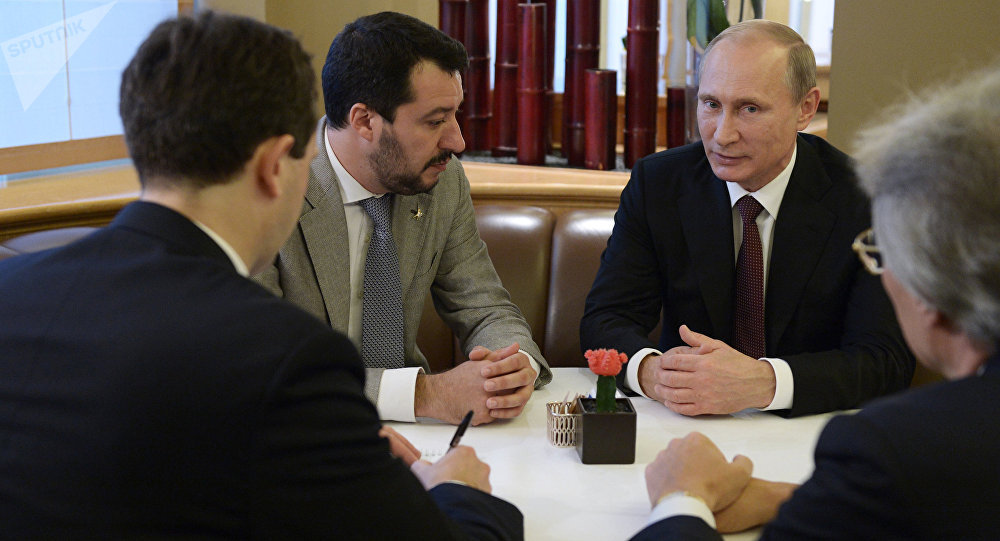Moscow is attempting to export jabs in Italy, despite the lack of regulatory approval, along with its soft power influence. Here’s how Italy became the target of the Russian propaganda campaign (once again)
On Tuesday Italy became the latest country set to begin production of the Russian vaccine Sputnik V, due to a partnership being struck between the Kremlin-controlled Russian Direct Investment Fund (RFID) and Adienne Pharma, a Swiss-based firm with a production centre near Milan.
This is the latest success of Moscow’s vaccine diplomacy campaign, which entails selling shots abroad, getting partners to produce them and online propaganda campaigns, such as the one recently exposed by the Wall Street Journal, from which Italy has not been immune.
The timing is not coincidental, as tensions are simmering in Europe (Italy included) over slow vaccine distribution. Some member states have granted emergency authorisation to Sputnik V despite warnings from the European Medicines Agency (EMA), the EU’s regulatory body, which is yet to review and clear the Russian shot.
“It’s somewhat comparable to a Russian roulette,” said Christa Wirthumer-Hoche, who chairs EMA’a board. “We need documents that we can review. We also don’t have data about vaccinated people.”
The production of Sputnik V has not been greenlighted by AIFA, Italy’s equivalent to EMA. Still, a growing number of Italian public figures is pushing AIFA to grant the Russian jab emergency authorisation. The pro-Sputnik front encompasses most of the centre-right area and includes Matteo Salvini, Italy’s most popular nationalist leader.
Mr Salvini, who recently ditched his hyper-nationalistic bravado to embrace Europeanism in order to make himself suitable to enter Mario Draghi’s government, seems to have put back on his old Eurosceptic hat in matters concerning the Russian jab.
The right-wing leader discussed Sputnik with the Secretary of State of San Marino, a tiny nation in central Italy that acquired and implemented Sputnik V in its vaccination drive. He also met with the Hungarian consul in Milan, as Viktor Orbán’s country currently produces the vaccine.
Mr Salvini has a history of cosying up to Vladimir Putin. In 2017 he flew to Moscow, where his party, the League, signed a comprehensive economic-political collaboration pact with the Russian leaders’ United Russia. Until recently, Mr Salvini’s political line has been fairly consistent with Mr Putin’s – and the Italian leader has rekindled that closeness over Sputnik.
The Italian government stated that it will abide by European guidelines. The EU remarked that even if Sputnik V began distribution in Italy, it would happen at a time when the country should have received all the necessary doses. Thus, no direct advantage will come to Italy even if the jab is approved – but Italian proponents hammer on.
Meanwhile, Moscow keeps scouting for production partnerships via the RDIF. According to a potential vaccine producer interviewed by Repubblica, the Russians who approached him offered technology transfer, know-how and resources amounting to four times those of Western competitors such as AstraZeneca.
Simply acquiring new production centres is already a win for Russia’s vaccine diplomacy efforts. Even if Sputnik V is not administered to Italians, the RDIF can ship it abroad. Italy, for instance, would be an excellent launchpad to reach African and Middle Eastern countries.
Despite having approved Sputnik V in August 2020 (and managing to do so by skipping “phase 3” mass testing), Russia only submitted the shot to EMA’s approval procedure in January 2021, with the latter’s rolling review beginning just last week.
Upon review of a later phase 3 testing, The Lancet announced that Sputnik V is 91.6% effective. Still, several virologists are urging caution due to the scarcity of available data, aligning themselves with the EU’s (and Italy’s) official line.
Therefore, jumping on the Sputnik bandwagon amounts to clashing directly with Italian and European institutions – which in turn means playing into the Kremlin’s hands. In parallel, Moscow is actively pouring gasoline of the embers of European tensions by striking production deals, offering shots and conducting digital psy-ops.
The stage is new, but the playbook is the usual. Russia’s multi-pronged approach in the field of vaccines is simply the most recent iteration of its endeavour to offer an alternative to the Western liberal-democratic order. So that the Kremlin, together with vaccines, can export its image and reinforce its soft power.








